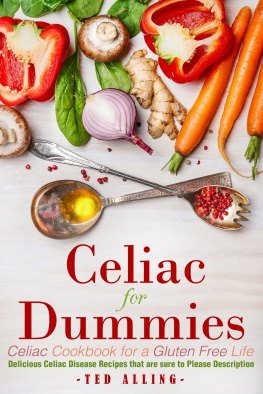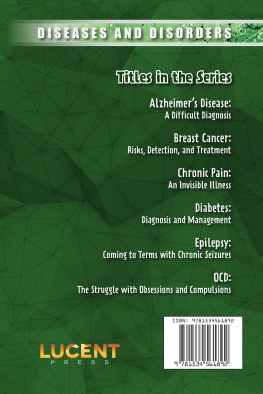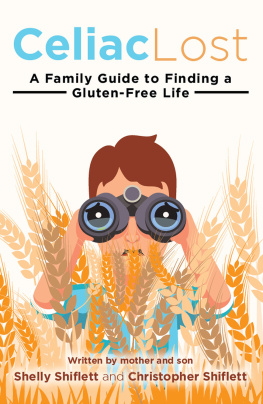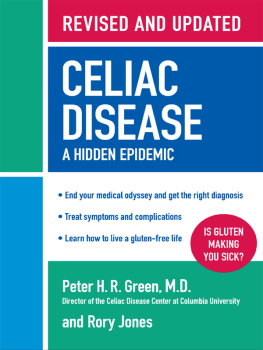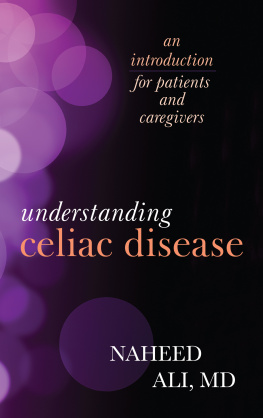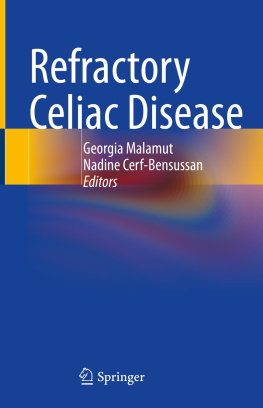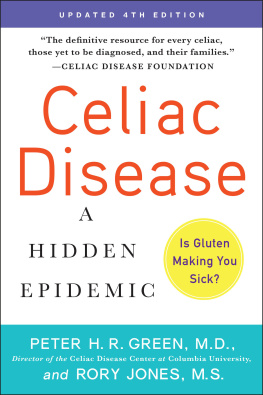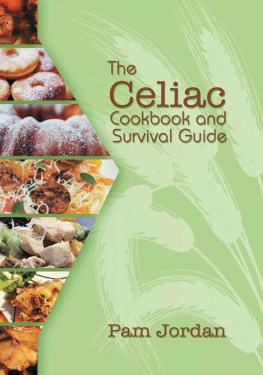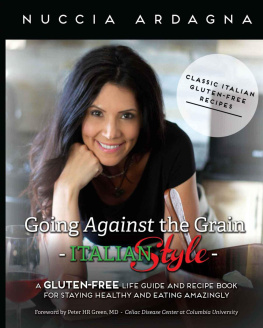

my journey with celiac disease
what doctors dont tell you
and how you can
learn to live again
Jennifer Esposito
with Eve Adamson

DA CAPO PRESS
A Member of the Perseus Books Group
Copyright 2014 by Bern Productions
All rights reserved. No part of this publication may be reproduced, stored in a retrieval system, or transmitted, in any form or by any means, electronic, mechanical, photocopying, recording, or otherwise, without the prior written permission of the publisher.
For information, address Da Capo Press, 44 Farnsworth Street, 3rd Floor, Boston, MA 02210.
Set in 12 point Adobe Garamond by Marcovaldo Productions, Inc., for the Perseus Books Group
Cataloging-in-Publication data for this book is available from the Library of Congress.
First Da Capo Press edition 2014
ISBN: 978-0-7382-1711-6 (eBook)
Published by Da Capo Press
A Member of the Perseus Books Group
www.dacapopress.com
Da Capo Press books are available at special discounts for bulk purchases in the U.S. by corporations, institutions, and other organizations. For more information, please contact the Special Markets Department at the Perseus Books Group, 2300 Chestnut Street, Suite 200, Philadelphia, PA, 19103, or call (800) 810-4145, ext. 5000, or e-mail .
10 9 8 7 6 5 4 3 2 1
This book is dedicated to every celiac,
whether diagnosed or not.
I hope this book gives you some understanding and peace.
I thank this community from the bottom of my heart.
You were the first to help me understand this new world.
contents
by Patrick Fratellone, M.D.
By Patrick Fratellone, M.D.
The last patient of the day on a cold December evening was Jennifer Esposito. I had never seen her Academy Awardwinning film, Crash, but I had seen the popular Friday night show, Blue Bloods. Yet, the woman sitting there in front of me seemed to have no correlation to the vibrant character she played on TV. This woman was distressed, unkempt, and suffering on all levels. Her chief complaint on the intake form read: Overall poor health. She wrote that she suffered from daily headaches with a severity of 7 to 8 on a scale of 10. Under duration she had written: For yearsgetting worse.
When she came to see me, Jennifer had already been diagnosed with celiac disease by biopsy as well as serum blood testing. She had been on a quest to remain 100% gluten free, but she was still having many health issues. She had suffered since childhood, and I wondered, as I listened to her story, how she had survived all these years. Clearly she was determined, and was highly motivated to understand her disease. I could relate to thatI have celiac disease, too, and it took me a long time to get diagnosed. Once I was, I wanted to know everything, just as she did. When I was diagnosed, nobody said anything about diet.
I explained to Jennifer that celiac disease is an autoimmune disease, and is often accompanied by other autoimmune diseases. She might well have some other condition that had yet to be diagnosed. I drew her a diagram of the small intestine that looked like a shag carpet. I explained that this protein, gluten, had flattened that carpet into a Berber rug. The small intestine is essential for the absorption of nutrients, the production of vitamin D3, and crucially, the manufacture of the neurotransmitter, serotonin. When serotonin is low, the body overproduces norepinephrine, which can cause severe anxiety. This process also depresses GABA production, which can cause sleep disturbance.
As I spoke, tears welled in her eyes and then she began to cry. The emotional impact of finally being heard by a doctor was overwhelming to her. We discussed food rotation as a way to take her gluten-free diet and make it even safer for her delicate system. We discussed the energy thieves in her life that were making her condition worsestress, overwork, anxiety. We discussed meditation and prayer. I began to paint a picture of the woman she would become as we wrestled down her celiac disease.
Today, I see a different Jennifer Esposito. She is not without health issues. Managing her disease is her daily duty, but she takes the job very seriously, and it shows. She has reclaimed a vibrancy she once had, and she is living a life that works. She has a purpose, and the energy she needs to fulfill it. She may not get to eat or even feel like someone who doesnt have celiac disease, but she gets to feel like herself. She is alive, inspired, and is reaching out to help others, through her blog, her bakery, and now, through this book. It has been a beautiful evolution to witnessfrom darkness, in the place she was when we first met, back into the light of her own purpose and promise.
I am proud and privileged to be part of her life, and to have played a small part in her discovery of her own new normal. She has taught me much over the years, which reminds me of the William Osler quote, Medicine is not taught in the classroom, but at the bedside. May this book teach you much as well, giving you the insight and the inspiration to take back your own life from the grip of celiac disease and learn how to live again.
Patrick Fratellone, M.D.
Being an actress and in the public eye for almost twenty years, I can count on one hand the number of times Ive been in the press for anything other than promoting the project of the moment. If you had told me years ago that I would write a book so openly about my personal life, I would have said you were crazy.
When I was diagnosed with celiac disease, all that changed and I felt almost compelled to tell my story. This disease has taken many twists and turns and has been at the root of many unanswered questions in my life since I was a child. The pain and suffering, not only physical but emotional, is something I wish on no one. If there is one paragraph, even just one sentence in this book that helps you in any way to understand what may be going on in your life with your health, then that is what I set out to do.
I believe there are a few very basic needs for us, as human beings. We want to feel safe, loved, accepted, and heard. Most if not all people with celiac disease are threatened in a big way. Feeling safe becomes something that doesnt apply to you anymore. You are not just in the hands of doctors who are often not able to tell you whats wrongfor most people, an accurate diagnosis takes yearsbut you are also at the mercy of every meal. Food becomes an enemy that you must keep your eye on at all times. Feeling loved gets threatened when family, friends, and society dont really get this disease, or at least not fully, or not yet. That can be very isolating at times, leaving people feeling unloved. That brings me to acceptance. Everyone wants to feel a part of something. Not being able to conduct your life as everyone else does is not only hard on the social aspect of your life, but on your heart as well.
Finally, that leads me to the last basic human need, and to be honest, this has been the biggest single reason I have opened my life up and related my struggles to you: so you can feel like you can tell your story and be heard. I take you all the way back through my childhood, in the hopes that you will see in my early symptoms clues to help you understand yours. I want to show you by example that not all celiac disease symptoms are stomach-related, and some symptoms can seem far-removed from your gut. I take you even further back, showing you that my mother and grandmother had symptoms, too, to show you that celiac disease can be passed along through families for generations, so you can look back at your own family history for clues and validation. When I finally found out I had celiac disease, I realized how far back it went.
Next page

